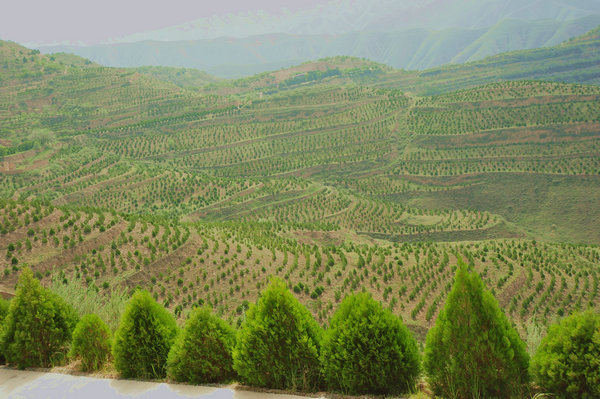 |
|
Gongjing Tree Farm in Yuzhong county. [Photo provided to China Daily]
|
More than 43 percent of Gansu's surface area, 195,000 sq km, is desert, and more than 27 percent, that is, 120,000 sq km, is sandified. This fragile environment greatly hobbles the province's economic growth.
Nevertheless, efforts to rein in desertification have borne fruit over the past eight years, the province's desert land shrinking by 1,914 sq km and its sandified land by 742 sq km. More than 1,000 companies engaged in this fight have been set up in the province over that time, and they are reckoned to have annual turnover of 15.3 billion yuan ($2.26 billion).
Of course, Crescent Spring is just one token of the battle against creeping deserts.
Starting from Lanzhou, the delegation travelled along the 1,000-km Hexi Corridor, the artery that connects China with Tarim Basin and Central Asia and served as a conduit for Buddhism, trade and military ventures in ancient times. In the corridor, west of the Yellow River, as the name Hexi indicates, four oases are strung along from east to west among deserts and semi-desert: Wuwei, Zhangye, Jiuquan and Dunhuang.
The landscape on both sides of the highway between Qilian Mountain in the west and Heli Mountain in the east changes continuously from semidesert on which tough, short shrubs grow, then land with more shrubs and green land on which taller trees grow. The change is particularly noticeable if you take the high-speed train that traverses the vast barren semi-desert of Jiuquan, passes by Jiayuguan, where the western end of the Great Wall built during the Ming Dynasty (1368-1644) is located, and takes you to Liuyuan South Station, northeast of Dunhuang.
In the 90-minute drive from the train station to downtown Dunhuang it is easy to see the changes of landscape from semi-desert, the wetter land where clusters of rose willow grow, and where trees and crops grow, and the green expanses on the outskirts of the city, where the kinds of landscape seen earlier are scarcely imaginable.

